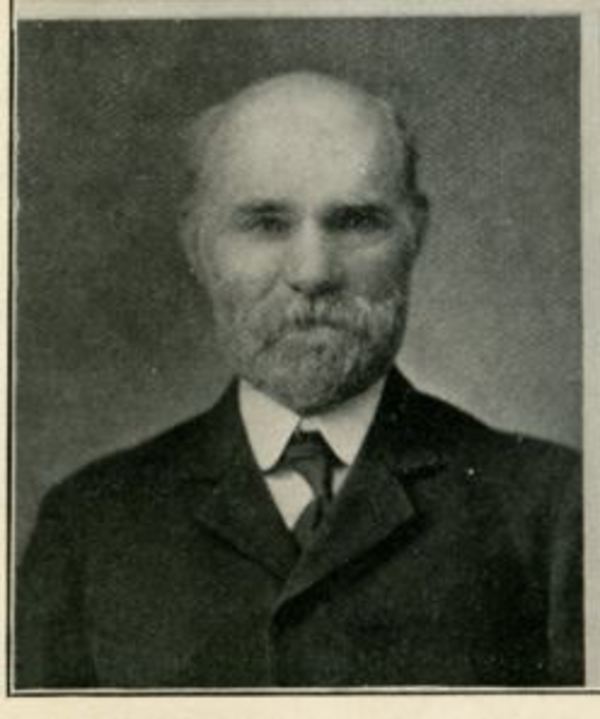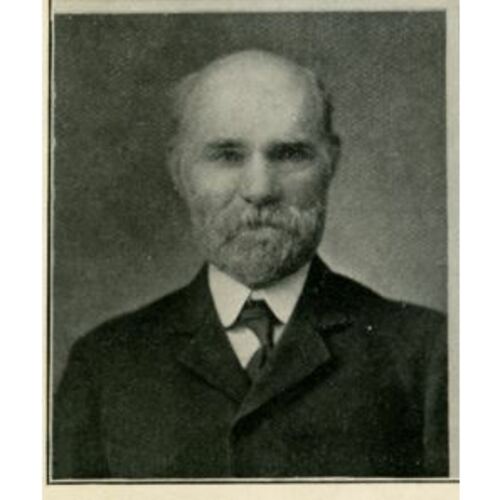
Source: Link
MACLELLAN, ROBERT, educator; b. 14 July 1849 in Durham, N.S., second son and sixth child of John Maclellan, a farmer, and Helen Hogg; m. 1 Jan. 1887 Martha Maria Fraser in Scotsburn, N.S., and they had three sons and a daughter; d. 12 July 1922 in Pictou, N.S.
Robert Maclellan’s great-grandfather Anthony Maclellan and his family shipped in 1775 from Balcary, Scotland, on the Lovely Nelly bound for St John’s (Prince Edward) Island. The following year the Maclellans relocated to West River (Durham) in Pictou County, N.S. Over the generations the family farmed; in 1871 John Maclellan owned an 80-acre operation. Robert attended school at Durham, Pictou Academy in Pictou, and, in 1871–72, Dalhousie College in Halifax, where he captured the gold medal in mathematics and rhetoric and the second prize in classics. He also proved to be a fair player in football and lacrosse. In the fall of 1872 an opportunity to teach arose and he took up the position, at Upper Green Hill (Greenhill) in Pictou County.
The following year Maclellan was employed in the preparatory department of Pictou Academy. In 1876 he became its English and classics master, a position he retained until the spring of 1883, when he resigned to become the inspector of schools for the district of Pictou and South Colchester. On 8 July 1889 he was appointed classical master and principal of Pictou Academy, succeeding (as principal) Alexander Howard MacKay, a strong disciplinarian. At the time the academy’s enrolment of 245 made it the largest such institution in the province, and one of the most influential. Under MacKay’s regime it had been used as a model to build a centralized provincial system of education, with a standardized curriculum, graded classes, and provincially controlled teachers’ examinations and licences. The secondary level of schooling at the academy was marked by wide access and rigorous examination.
Maclellan had not been the first pick of the academy’s board – it had wanted Ebenezer Mackay – but in the event he continued the exceptional leadership of his predecessor. When the building burned down in 1895, Maclellan and the board were able to have a three-storey structure erected within two years. Its library, science laboratory, and Convocation Hall were considered foremost in the province. In 1897 the British Association for the Advancement of Science praised the academy’s extensive collection of specimens. During Maclellan’s tenure, graduates led the province in matriculation examinations for entry to Dalhousie (1890–93), in the number of graduate students there (1895), and in marks achieved by fourth-year students in Nova Scotia (1912). As well, an academy student, Frank Parker Day*, secured a Rhodes scholarship in 1905. The Pictou Academy Alumni Association was formed in 1893 to retain graduates’ interest; it raised money and offered a number of medals and prizes to foster academic excellence. In order to temper this meritocratic academic thrust, Maclellan introduced social and athletic activities in 1898–99. His support of student pleas for lighter workloads led to provincial curricular revisions in 1908. He also promoted the successful centenary celebrations at Pictou Academy in 1916.
Maclellan’s style of leadership was more subtle than the authoritarian manner of MacKay. For instance, he opted to suspend rather than expel two students found guilty of public intoxication. Later, faced with demands that a staff member be fired, he quietly obtained a resignation through a three-month severance package. At the school socials he emphasized respectability and the deportment of “true gentlemen and ladies.” His efforts to foster cooperation and a cohesive school culture were well suited to students from the town of Pictou, but they had a limited effect on those who, beginning in 1890, commuted by train from New Glasgow. They and rural students from elsewhere in the county, as well as several female students, felt increasingly alienated. Elizabeth Tibbel, a rural student who enjoyed the art program and wrote poetry, never showed her poems to the teaching masters because she lacked the courage to do so. In another example, from 1913, the academy’s board denied the request of female students to use Convocation Hall to play basketball, in imitation of their male colleagues, who had begun using the Young Men’s Christian Association for gymnasium classes two years before. The school culture changed even more during World War I, when the myth of a virtuous Scottish past, which emerged from a stirring address delivered during the centennial celebrations of 1916 by Arthur Stanley Mackenzie*, president of Dalhousie, combined with wartime realities to create a new sense of community within the academy.
Maclellan’s three-decade tenure would be largely marked by consensus and conciliation, a situation that resulted in his immense popularity with both students and staff. The rigorous academic training he promoted allowed many talented young men to flourish in their professions. The gold medal students who would leave their mark on the nation included Henry Fraser Munro* (1893), later a superintendent of schools for Nova Scotia, James McGregor Stewart* (1906), a lawyer, financier, and close friend of Maclellan, and John Hamilton Lane Johnstone (1908) and George Hugh Henderson (1910), the Dalhousie professors who developed a method during World War II to degauss vessels to protect them from magnetic mines. Many other students used their programs to gain access to the teaching profession and to improve their licences. Under Maclellan’s able leadership, the academy continued to foster academic excellence and a middle-class cultural ethos, which spread throughout Pictou County and beyond. Little wonder that scholars have observed that he “re-established a genuine love of learning in the institution.”
In 1908 Maclellan was awarded an honorary lld by Dalhousie. The staff and former staff of Pictou Academy presented him with a silver loving cup in recognition of the honour. In 1916, during the centennial celebrations, he was tendered a dinner which lasted six hours. From 1914 Maclellan had begun to suffer from indifferent health. He submitted his resignation on 11 Feb. 1919; three years later he was dead. His funeral was held at First Presbyterian Church in Pictou under the direction of the Oddfellows’ Easter Star Lodge No.1. Buried in Haliburton Cemetery, he was survived by a son and a daughter and two brothers, James of Rogers Hill and William Edward, a postal superintendent and author. A final tribute to Robert Maclellan came in 1933 when an anonymous donor (likely James McGregor Stewart) established a scholarship in his name. At the time he was described by the Pictou Advocate as “a most inspiring teacher of the humanities and a delightful companion.”
A photograph and a plaque honouring Robert Maclellan hang on the walls of Pictou Academy in Pictou, N.S.
NSARM, Pictou (town), board of school commissioners, minutes of meetings, 1889–1919 (mfm.). Halifax Herald, 13 July 1922. Pictou Advocate, 5 May 1908, 6 Dec. 1913, 21 July 1922. Journal of Education (Halifax), 3rd ser., 10 (1920–22), no.6. C. J. W. Kedy, “Pictou Academy from its founding to the present: an important narrative in the history of education in the province of Nova Scotia” (m.ed thesis, Mount Allison Univ., Sackville, N.B., 1933). J. P. MacPhie, Pictonians at home and abroad (Boston, 1914). B. A. Wood, “Constructing Nova Scotia’s ‘Scotchness’: the centenary celebrations of Pictou Academy in 1916,” Hist. Studies in Education (London, Ont.), 6 (1994): 281–302; Pictou Academy in the nineteenth century (Pictou, 1997); “Pictou Academy: promoting ‘schooled subjectivities’ in 19th-century Nova Scotia,” Acadiensis (Fredericton), 28 (1998–99), no.2: 41–57.
Cite This Article
Allan C. Dunlop and B. Anne Wood, “MACLELLAN, ROBERT,” in Dictionary of Canadian Biography, vol. 15, University of Toronto/Université Laval, 2003–, accessed December 28, 2025, https://www.biographi.ca/en/bio/maclellan_robert_15E.html.
The citation above shows the format for footnotes and endnotes according to the Chicago manual of style (16th edition). Information to be used in other citation formats:
| Permalink: | https://www.biographi.ca/en/bio/maclellan_robert_15E.html |
| Author of Article: | Allan C. Dunlop and B. Anne Wood |
| Title of Article: | MACLELLAN, ROBERT |
| Publication Name: | Dictionary of Canadian Biography, vol. 15 |
| Publisher: | University of Toronto/Université Laval |
| Year of publication: | 2005 |
| Year of revision: | 2005 |
| Access Date: | December 28, 2025 |



